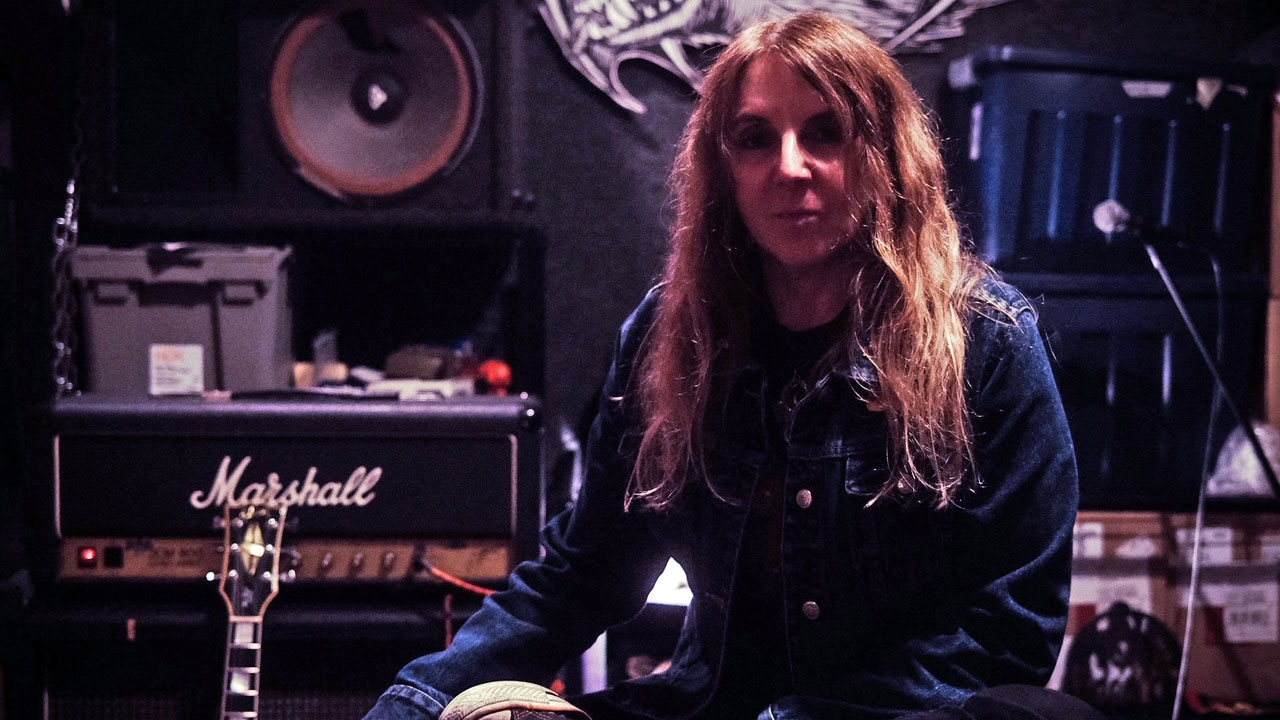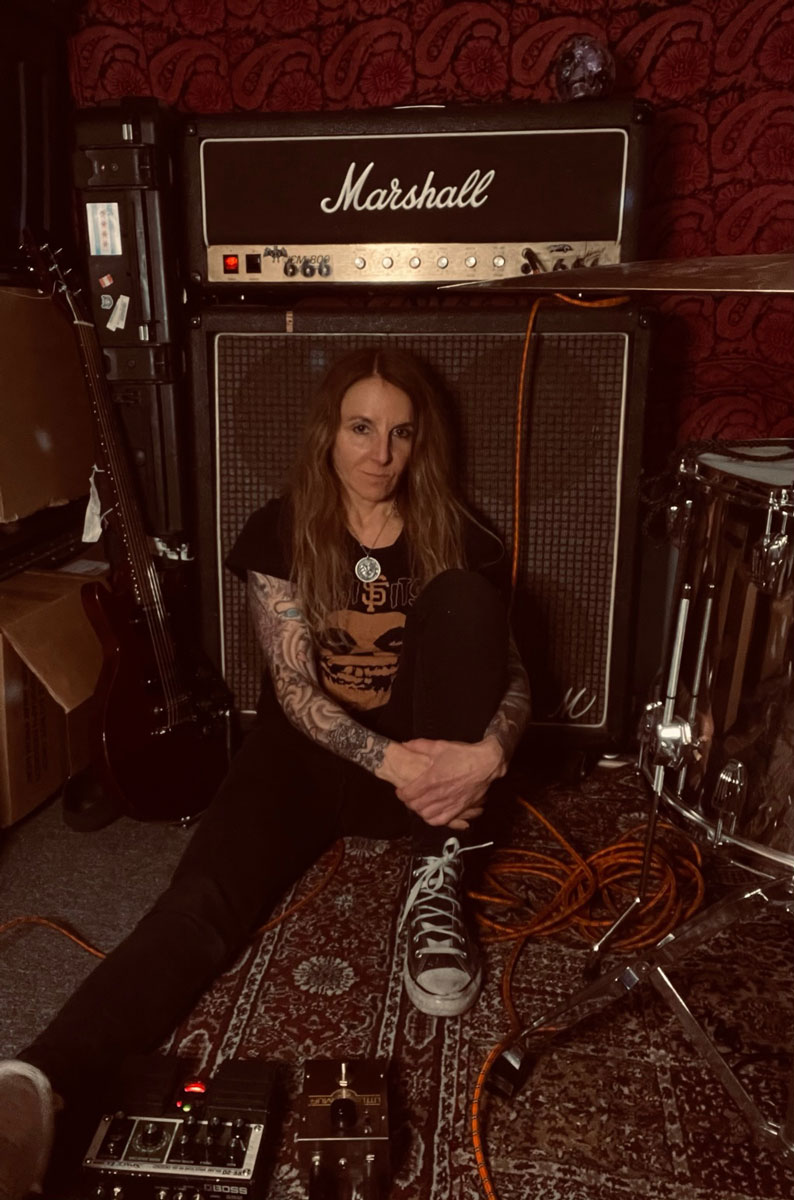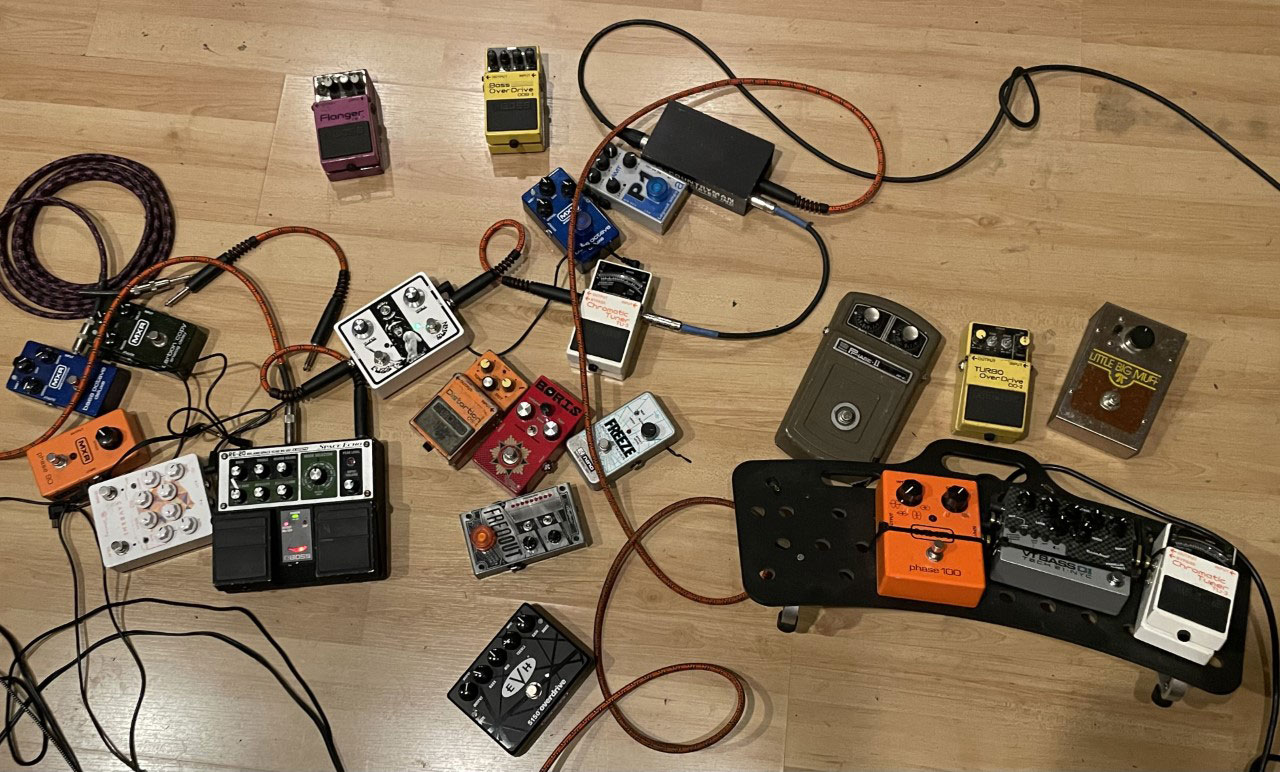Acid King's Lori S. talks out-riffing leather-clad shredders, why she's a Les Paul lifer and the art of the perfect stoner solo
New album Beyond Vision finds the stoner rock staples' slow-burning sonic stew laced with mountains of pedals, and asks the question: what's the rush for the next note?

For 30 years, Lori S., aka Lori Joseph, has been a pillar of the stoner rock community, treating fans to a deluge of molten riffs and seething solos. Through an early education via punk rock and a few chance encounters along the way, Joseph caught the guitar bug as a young gun, fusing elements of new wave, classic rock, and heavy metal into her already eclectic mix.
"While my roots and first bands were punk bands, I learned a lot of blues riffs and scales at the time," Joseph reveals.
"Kelly Johnson of Girlschool was my idol. I think even in those bands, you could hear blues scale leads in punk songs. I went full circle with music before I played guitar. I worked in record stores, and I grew up on classic rock. I loved Black Sabbath back in the '70s and then moved into new wave. From there, it was all British punk and hardcore, then into American punk and hardcore, and then back into heavy metal, and back to classic rock. [Laughs]
"My entire experience in music throughout my life is what created the person I am today: Jimi Hendrix, wah pedal, and my old punk-rock boyfriend had an Echoplex that I thought was so cool. So yes, I would say that even though the old punk-rock songs are not in the mix, the spirit of my history definitely is."
With her influences splaying in various directions and a newfound love for all things guitar, Joseph began honing her craft to deliver her bristling message. These days, the veteran axe-slinger is known for having a vintage Gibson perpetually slung over her shoulder, but in her earliest hours, another guitar first caught her eye.
"I started out playing Fenders," Joseph recalls. "I had a Fender Mustang and Fender Stratocaster. I really didn't know much about guitars or tones or what my sound was early on. My punk-rock boyfriend, Eric Brockman – RIP – from Life Sentence, taught me how to play the guitar, and he had Fenders, so I had Fenders. Down the road, as I started to play other genres and become a better guitar player, a metal friend of mine back then told me, 'Fenders were for *insert un-politically correct word here*,' and that I 'needed a Gibson.'"
"With that, I was off to the guitar store," Joseph continues. "I purchased my 1973 Gibson Melody maker with the rosewood neck and immediately put in double humbuckers. I immediately noticed that it was so much easier to play and had a much better tone for what I wanted to play. So, my friend was right!"
Get The Pick Newsletter
All the latest guitar news, interviews, lessons, reviews, deals and more, direct to your inbox!
Now three decades into a career built around bringing the proverbial noise, Joseph is preparing to unleash Acid King's eighth full-length record, Beyond Vision. Although this record contains many hallmarks that have long linchpinned the sound of Acid King, Joseph's compounding songsmith and continued evolution as a slow-burning six-stringer are readily apparent.
As she prepared for Acid King's spring and summer jaunt, Lori S. dialed in with Guitar World to dig into the nuts and bolts of Beyond Vision, her love for vintage gear, the art of the perfect stoner rock solo, and more.
How has Acid King evolved in the eight years since the release of Middle of Nowhere, Center of Everywhere?
"Middle of Nowhere, Center of Everywhere was a small step in the direction I was going with my music, and Beyond Vision is one giant leap. At the end of 2019, after the Busse Woods 20th anniversary tour, I found myself without a bass player and at the start of a pandemic. This is where the giant leap began.
"Years before, I had an offer from Blues Funeral Recordings to record 45 minutes of anything I wanted for their Post Wax II series. A nine-band box set with colored vinyl and a diorama gatefold. Custom artwork by awesome illustrators and art directors, as well as a board game that is connected once you purchase all the records. It seemed like a great idea to do something different.
A long time ago, I decided to play in drop D with Acid King and have never turned back. I find this to be 'my key' – one I gravitate to when writing and singing
"So, I reached out to longtime friend and fellow musician Jason Landrian, whose band Black Cobra was on a hiatus at that time, to see if he would be interested in collaborating with me on this, and he was. This release was never intended to be the 'next new Acid King record'; it was going to be my experimental release, but as time went on and the songs evolved, it was much more than just an experimental record.
"During that time, we recruited bass player Bryce Shelton, and the drummer left the band 3/4 of the way into it. Enter Jason Willer of Charger and Jello Biafra's Guantanamo School of Medicine. Bryce toured with him during a US tour for Hawkwind and thought he would be a great fit. So, the evolution of the band was pretty much a mixed cocktail dictated by members leaving, opportunities to release a recording of my choice, and new players joining.
And how are the effects of those events best reflected with Beyond Vision?
"The combination of this all is what created Beyond Vision, and I do not believe it would have come out the way it did any other way. The collaboration with Jason and my vision led to his experimentation with ambient sounds in GarageBand, where he learned the program and was able to put my vision to reality. We both were going into musical territory neither of us had been in before, and this was the biggest reflection of sounds heard on the new record."
Describe your present-day approach to the guitar. What has changed most since your early days, and what prompted that evolution?
"A long time ago, I decided to play in drop D with Acid King and have never turned back. I find this to be 'my key' – one I gravitate to when writing and singing. The early days were regular tuning, and when I really started getting into heavy and slow music, it was learning about drop D, which really is a big part of the Acid King sound."

Is your music initially based around your guitar, or do you use the guitar to tell the story thereafter?
"The songwriting process has always been based on the guitar. I plug in and start playing and record riffs. Once I have some riffs to play, I jam them with the band, and the song progresses from there. This new release was a bit different as I had a writing partner, and many of the ideas were started from the ambient sounds on some of the songs, so it was a mix between guitar riff writing and ideas that came from sounds into guitar riffs."
Which songs from the new record best represent you as a guitarist?
"For me, I would say the last song, Color Trails. The entire recording is in order of a journey: one that could be in your mind, one that you went on, and in our case, one while spending nights in the studio under quarantine, deep in conversations about life in general and life on the road. This is my 'return to Earth' song or my return home.
"So, as the journey comes to an end, the song starts out with a very thought-provoking guitar delay using my Roland Space Echo RE-20, and the drums kick in with a punch-in-the-gut single heavy reverbed drumbeat. Then it levels off at 35,000 feet into cruising altitude as I channel my biggest influence, David Bowie.
"With the following riff and guitar lead, it then ramps up into what can be described as when the LEM <Apollo Lunar Excursion Module> breaks off from the spaceship for landing. It is very frenetic, and the drums are playing a very fast and smooth tribal beat while the guitar delay ramps up to match. And then the landing comes in, an abrupt stop guitar delay still on beat while drums got back to a single heavy reversed drum beat and ends up with a Space Echo blast at the end."

Why is the Gibson Les Paul your primary weapon of choice?
"Yes, I have a Les Paul – my '73 Les Paul Custom with a burgundy finish which I've owned since 1996. But my first Gibson was its little brother, a 1973 Gibson Melody Maker with the same burgundy finish, with a double humbucker mini stack. As for why I love it, I had an old Marshall head, and it was in the shop getting repaired, and I got a modified loaner that was like 200 watts.
"I was blown away by the sound and was determined to get that tone, which I discovered was the Les Paul Custom and my vintage Electro-Harmonix Little Big Muff. I really couldn't say at this point if another guitar could produce my tone, but I love what I have, and I have no desire to change my setup. It's perfect the way it is."
What amps and pedals did you deploy in the studio during the recording of Beyond Vision?
Solos have got to be slow and low, with heavy sustain and a deep groove. That is my stoner rock special sauce
"It's a long list, but here goes: I have a JCM800 2203 100-watt Lead head, which I purchased from the same metal friend back in the day since Marshalls were not cool anymore in the '80s. [Laughs] I have a vintage circa 1978 straight Marshall cab and a matching JCM800 slanted cab. I've had these for over 35 years.
"As for the pedal collection, it's getting bigger on this record: Roland Space Echo RE-20 for delay and reverb, the aforementioned vintage Electro-Harmonix Little Big Muff, and a Roland Phase II. I pretty much only use classic double humbucker pups in my guitars, and I love the sounds I can achieve with my setup.
"I used a lot of pedals on the record. Of course, it's fun to play with lots of pedals in the studio – so we did. [Laughs] We were searching for that perfect effect for a particular part and just started plugging them in and playing them all.
"I really fell in love with the [Keeley] Caverns pedal. Bryce owns that one. I played no other guitars on this release but my Les Paul and Melody Maker, but Jason did use his B.C. Rich. I think these choices just really show how much attention to detail was put into Beyond Vision."
You seem to prefer vintage, but is there a place for new guitars in your arsenal, too?
"As you can see by the length of time that I've owned all my gear, I am a lover of vintage. That's not to say I would not buy something new, but I really just don't have a need for it. The 1973 Les Paul Custom is the one. It is just perfect. The combo of that guitar with my Little Big Muff and Marshall JCM800 is me. It's the cocktail that makes up my tone."
What's your methodology for creating the perfect stoner rock solo and riff?
"Solos have got to be slow and low, with heavy sustain and a deep groove. That is my stoner rock special sauce. So, however you're able to achieve that, as far as I'm concerned, that's what does it. That, and holding on a note for a beat because, really, what's the rush to the next one? I often think, 'How does it make me feel when I play it?' But ultimately, I just know it when I hear it.
"I think my riffs have progressed in a more polished manner, I guess. I would say in the past, it was about how loud and slow you could play, but I don't really write like that anymore. In general, stoner rock has a wide reach, from super-slow and low to desert rock stoners, which are faster. There are sub-genres of stoner rock now, and although Acid King is lumped into that category, I feel like Beyond Vision breaks out of that category."
As a woman in a traditionally male-dominated field, what challenges have you faced, and how have you conquered them?
"These days, I don't really have any issues. There have been times in the past when they may be some unwanted mansplaining, the 'you're pretty good for a girl' comment, but this hasn't happened for years. The only thing to date that comes to mind is me trying to get backstage and the doorman pegging me as a groupie or someone's girlfriend. He just could not wrap his head around the fact that I was the headliner.
"So, yeah, that was very annoying, but like I said, thankfully, that is a rarity these days. A long time ago, I used to get intimidated at festival shows with all these dudes around me, where many times, I was the only female performer in the entire festival. It was all these shredders in leather pants, but then I'd get on stage, plug in, hit one note, and that all went away."
What's next for you in all lanes?
"Practice, practice, and more practice. We've got to learn to play Beyond Vision live as we prepare for our first live show in support of it in San Francisco on June 3, 2023. We'll be playing at The Great American Music Hall, followed by a European Tour in August."
- Beyond Vision is out March 24.
Andrew Daly is an iced-coffee-addicted, oddball Telecaster-playing, alfredo pasta-loving journalist from Long Island, NY, who, in addition to being a contributing writer for Guitar World, scribes for Bass Player, Guitar Player, Guitarist, and MusicRadar. Andrew has interviewed favorites like Ace Frehley, Johnny Marr, Vito Bratta, Bruce Kulick, Joe Perry, Brad Whitford, Tom Morello, Rich Robinson, and Paul Stanley, while his all-time favorite (rhythm player), Keith Richards, continues to elude him.
“I said, ‘Let’s get Hendrix to play on it.’ His manager said, ‘Jimi’s playing shows back-to-back.’ So we got Jimmy Page”: The hit ’60s single that was supposed to feature Jimi Hendrix… but ended up with Jimmy Page
“It was tour, tour, tour. I had this moment where I was like, ‘What do I even want out of music?’”: Yvette Young’s fretboard wizardry was a wake-up call for modern guitar playing – but with her latest pivot, she’s making music to help emo kids go to sleep









![John Mayer and Bob Weir [left] of Dead & Company photographed against a grey background. Mayer wears a blue overshirt and has his signature Silver Sky on his shoulder. Weir wears grey and a bolo tie.](https://cdn.mos.cms.futurecdn.net/C6niSAybzVCHoYcpJ8ZZgE.jpg)
